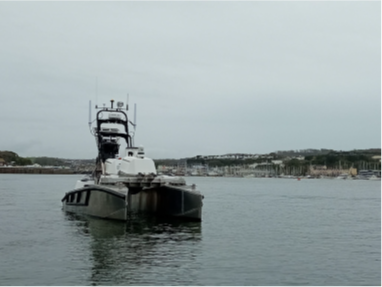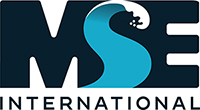SPINE completes successful on-water demonstration

SPINE is a project being led by MSE International looking at ship-shore integration from an energy and autonomy perspective. The project brings together elements of infrastructure, data, automation and supporting communications. SPINE (Shipping and Port Interfaces In New Era) is being supported by MarRI-UK as part of the Smart Maritime Land Operations Call.
Part of the SPINE project has developed shipboard fault detection and reliability technology for integration of smart and autonomous vessels. Project partners HydoSurv and National Oceanography Centre were recently involved in a successful on-water demonstration of the onboard monitoring system, and the messaging system into wide land-side operations. A USV (Uncrewed Surface Vessel) developed by Hydosurv performed the demonstration at a permitted test area at Cawsand Bay, Plymouth Sound, relaying live data to HydoSurv's Remote Operations Centre (ROC) in Exeter. A series of tests, performed using actual on-water telemetry and simulated fault data presented to the system showed the capability of the system to detect the onset of system errors.

The image shows members of the team at the Remote Operations Centre while the on-water demonstration is taking place.
Consistent with HydroSurv's extended testing prior to the demonstration, the system could correctly identify faults and discrepancies between multiple sensors to provide a level of explainable, actionable interpretation of a fault onset. The aim of the system is to eliminate the burden on human-operators watchkeeping on remotely-operated vessels, speeding up the trend for de-crewing. The trial successfully showed fault detection and categorisation of risk using critical telemetry data from lithiun batteries, cooling systems and fire detection as well as positioning errors and mechanical defects.

USV heading out for the on-water testing.
Smart and autonomous shipping is reliant on robust datalinks between ship and shore. Alongside HydroSurv and National Oceanography Centre's work within this SPINE work package, other partners are working on solutions to enable the improved flow of data from ship to shore providing opportunities for additional integration of maritime and land-side operations that are not available via traditional shipping.
The partners involved in this part of the SPINE project include Marico Marine, an independent marine consultancy specialising in services for ports, harbours and energy sectors, Frequentis, safety-critical communication and information experts and experts from the University of Plymouth, specialising in AI in marine autonomy.
To be kept up to date with the results and activities of the SPINE project, as well as other projects in the Maritime Decarbonisation area please subscribe to the MSE International Maritime Decarbonisation Interest Group here.



